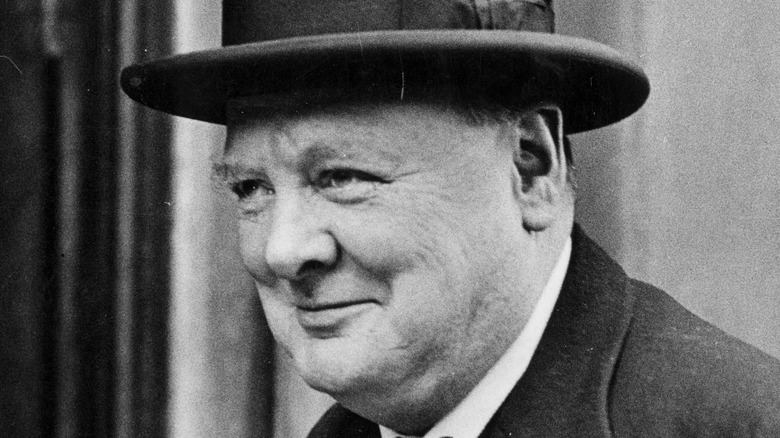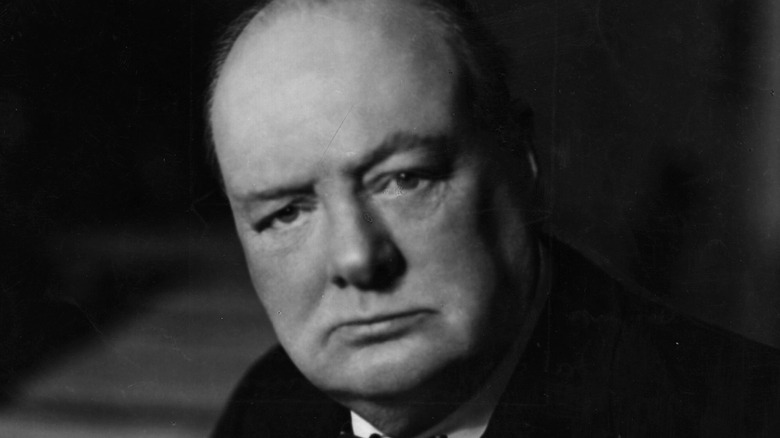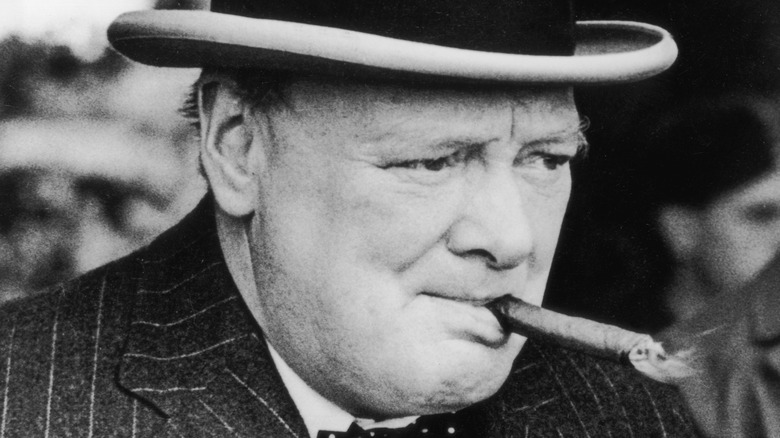These Were Winston Churchill's Last Words Before His Death
When it was announced on January 24, 1965 that former British Prime Minister Winston Churchill died at the age of 90, his death was considered by many in Great Britain and elsewhere to be the end of an important era in history, according to "Churchill: Walking with Destiny," a Churchill biography by Andrew Roberts. On the occasion of Churchill's death, historian Sir Arthur Bryant wrote (via "Churchill: Walking with Destiny"), "The day of giants is gone forever," while novelist V.S. Pritchett claimed that the past was now "irrecoverable." Similarly, French President Charles de Gaulle met the news of Churchill's demise with these words: "Now Britain is no longer a Great Power."
As Roberts wrote, Churchill, who fought in several international British conflicts in his lifetime, and who as Prime Minister led his country through World War II, was treated to one of the grandest non-royal funerals in British history. It was broadcasted on BBC, nine military bands performed in tribute to the late prime minister, and in a break from protocol, Churchill's was only one of two public funerals attended in her lifetime by the late British Queen Elizabeth II. While the public was treated to this kind of pomp and ceremony, details of Churchill's death later revealed the tragic circumstances of his final days.
Those details included the uncanny fact that Churchill died on the anniversary of his own father's death, as he predicted years earlier (per the Daily Mail). Others, however, were haunting, such as the austere and disturbing last words Churchill uttered to his son-in-law, as Roberts chronicles.
Churchill's bleak final years
Winston Churchill was well known for his shimmering wit all throughout his long life. As early as his 75th birthday in 1949, for example, Churchill told the assembled well-wishers: "I am ready to meet my maker. Whether my maker is ready for the ordeal of meeting me is another matter," according to "The Wicked Wit of Winston Churchill," a collection of the politician's witticisms. Due to that fact, Churchill's despairing final words came as a surprise for many to learn. His boundless energy and socialite lifestyle — he constantly smoked cigars and reportedly drank champagne almost continuously — Churchill was also open about those times in his life that were far from joyous.
According to psychology professor Nassir Ghaemi (via The Conversation), the beloved former prime minister suffered from chronic depression throughout his life, then more commonly known as 'melancholia' with some apparent symptoms consistent with today's definition of bipolar disorder, characterized by manic periods punctuated by deep sadness. And though Winston Churchill was still officially working as a member of Parliament a year before his death, the three-time British prime minister had in fact been ill for some time. As told by historian Roy Jenkins in his book, "Churchill," at 77 years old in 1951, Churchill was again voted in as Prime Minister. But even at that point, many around him already believed he was too physically impaired to perform the role. Churchill, stubborn as ever, doggedly ignored them.
Churchill's 'black dog'
Winston Churchill, in fact, only resigned his office as prime minister under pressure in 1955, ten years before his death. He was then replaced by Anthony Eden. Churchill biographer Roy Jenkins also suggests that Churchill's reluctance to give up power years earlier may well have affected his health in the years leading up to his death. From the earliest years of World War II onward, Churchill was prescribed by his doctor, Lord Moran, amphetamines to help address his chronic depressive episodes and barbiturates to help him sleep. The ups and down of depression were such a constant companion for Churchill that he even had his own nickname for it: The Black Dog.
According to The New York Times, Churchill's final words were uttered on January 15, more than a week before his eventual death. He first suffered a "cerebral arterial spasm" in December, according to Andrew Roberts' book, "Churchill: Walking with Destiny," and he then had a stroke on January 9. His long-declining health perhaps shed some light on the frustration evident in his last words. With ill health plaguing him for so long, it follows that circumstances may have brought his mood so low in those final days, as the bleak final words spoken to his son-in-law, Christopher Soames, demonstrate (via The New York Times): "I am bored with it all." Nonetheless, Churchill is remembered to his day for his exuberance in life as much as his political accomplishments.
If you or someone you know needs help with mental health, please contact the Crisis Text Line by texting HOME to 741741, call the National Alliance on Mental Illness helpline at 1-800-950-NAMI (6264), or visit the National Institute of Mental Health website.


